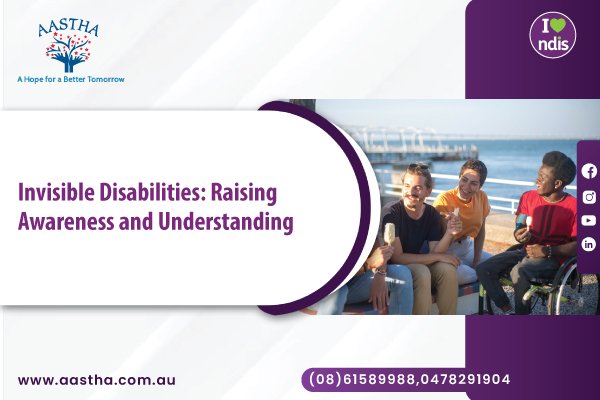- (08) 6158 9988, 0478 291 904
- 26 Kearns Crescent. Ardross. WA. 6153
- connecting@aastha.com.au

Invisible disabilities are conditions that are not immediately apparent to others, making them particularly challenging for those who live with them. Sometimes referred to as hidden disabilities, these are conditions that don’t always exhibit clear physical or visible signs. A person may appear perfectly healthy, yet they may be dealing with severe pain, exhaustion, cognitive challenges, or emotional distress. Some common examples of invisible disabilities include Autism Spectrum Disorders, Multiple Sclerosis, Mental Health Conditions, Autoimmune diseases etc.
A significant hurdle for individuals living with invisible disabilities is obtaining proper support and assistance to navigate their day-to-day lives. The NDIS, initiated in Australia in 2013, is a comprehensive disability support scheme designed to provide support and funding for individuals with disabilities. It is a crucial safety net for many, including those with invisible disabilities, by ensuring access to services, therapy, and adaptive equipment. While having an invisible disability doesn’t render someone ineligible for the NDIS, at times, they may encounter challenges in accessing the necessary funding. Raising awareness and understanding of invisible disabilities within the NDIS framework is an ongoing and important endeavour. It is essential for ensuring equitable access, reducing stigma, and providing personalised support to those who need it most. The NDIS should continuously work to make its processes and guidelines more inclusive and flexible, ensuring that individuals with invisible disabilities are not left behind. As of now, people with invisible disabilities can reach out to their Local Area Coordinators who are available to offer advice, knowledge, and assistance to access the NDIS.
Aastha Community Services is dedicated to increasing awareness and understanding of invisible disabilities as well as to help reduce stigma and misconceptions surrounding them. We understand that all disabilities are not immediately visible and that support should not be contingent on the visibility of a condition. Contact us today to find out how we can help you to access the necessary NDIS support and services.
